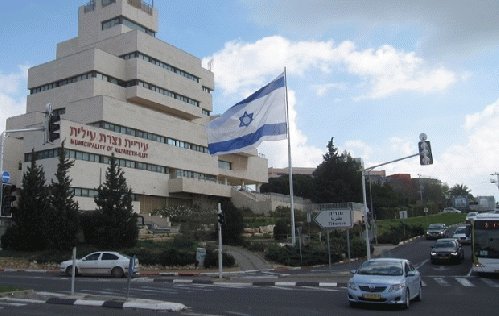Reprinted from Middle East Eye

An oversized Israeli flag guards the entrance to the city of Upper Nazareth
(Image by (MEE/Jonathan Cook)) Details DMCA
UPPER NAZARETH, Israel -- For nearly 60 years, the historic city of Nazareth has been living with an unwelcome neighbor.
Upper Nazareth was built on Nazareth's confiscated lands on the orders of Israel's first prime minister, David Ben Gurion. It was part of an official campaign to "Judaise" the only Palestinian city to survive relatively unscathed from the 1948 war.
But if Upper Nazareth and its Jewish residents were supposed to overwhelm the Galilee city that, according to the Bible, was home to Jesus, it has largely failed.
A far greater danger, admit Upper Nazareth's officials, is that their small city now risks being overrun by the region's Arab population, especially as residents of Nazareth, many of them Christians, flee major land shortages and a near-bankrupt municipality.
Upper Nazareth's mayor, Shimon Gapso, recently conceded that the proportion of Arabs in the city -- once inhabited almost exclusively by Jews -- has risen dramatically over the past 15 years.
One in five residents is now reported to be Arab, members of Israel's large minority of 1.5 million Palestinian citizens.
According to human rights groups, fears of an Arab takeover stand behind a raft of controversial municipal measures, from banning Christmas trees and blocking the building of a school teaching in Arabic to the latest: refusing to stock books in Arabic at local public libraries.
Unusually, Gapso is tight-lipped at the moment. He was found guilty of bribery in February, but the presiding judge surprised observers by sentencing him to only six months' community service on 26 April. Although the sentence allows Gapso to return to office, the prosecution is expected to appeal the sentence. Gapso's suspension is also likely to continue because he is facing another corruption case, due to be heard shortly.
He has refused interviews for the time being, though he told reporters as he left the court in Haifa: "I am a law-abiding citizen. ... I haven't a shadow of a doubt that I will return to the mayoralty of Upper Nazareth."
Gapso, however, has told MEE that he stands behind earlier public statements about the need to keep the city Jewish, even as the municipality faces being taken to court over what human rights groups describe as the city's "racist" policies.
Proud to be "racist"In a now-infamous response to what he called "bleeding-heart" critics published in 2013 in the Haaretz newspaper, Gapso wrote: "I'm not afraid to say it out loud " Upper Nazareth is a Jewish city and it's important that it remains so. If that makes me a racist, then I'm the proud offshoot of a glorious dynasty of 'racists'."
According to Mohammed Zeidan, director of the Human Rights Association in Nazareth, Upper Nazareth's policies are not simply a reflection of the mayor's personal initiatives, but part of a wider political culture found in both the city and Israel.
"It is bound up with the concepts of a 'Jewish city' and Israel's Judaisation program in the Galilee," Zeidan said. "The racism was inherent in Upper Nazareth's establishment as a way to neutralize the supposed threat posed by a large Arab population the state regarded as the 'enemy'."
(Note: You can view every article as one long page if you sign up as an Advocate Member, or higher).





